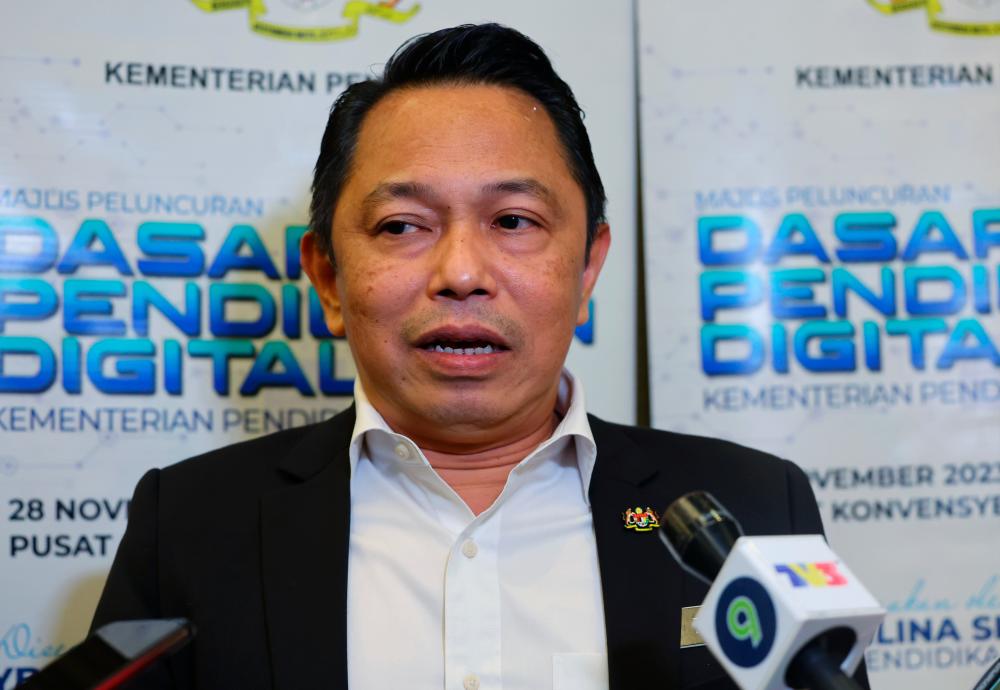BANGI: The Digital Education Policy (DPD) launched by the Education Ministry (MOE) yesterday demonstrates the MOE's commitment to transform the country's education system to produce digitally literate students capable of using the latest technology in an integrated, creative, innovative, responsible and ethical manner to address future challenges.
Zainal Abas (pix), MOE’s Educational Resources and Technology Division director, said the policy is a continuation of the existing policies and initiatives related to improving the quality of education that emphasises the use of digital technology.
He said the policy focuses on digital education specifically, based on a comprehensive and integrated ecosystem, outlining four objectives, six cores, 18 strategies, and 41 initiatives that set the direction for achieving digital education transformation.
The DPD aims to drive changes in the digital education landscape to produce a digitally competent generation that is competitive through the improvement of knowledge, skills, and values of students, educators, and education leaders; the provision of quality digital infrastructure, infostructure, and content; and optimising active engagement with strategic partners as catalysts for digital education.
“The Covid-19 pandemic in 2020 has accelerated the acceptance and increased the momentum and commitment to empower the country's digital education.
“Therefore, the comprehensive DPD was formulated to meet the needs and challenges of the future,“ he said during the policy launch ceremony by Education Minister Fadhlina Sidek at the Bangi Avenue Convention Centre on Tuesday.
Zainal said in her speech during the launch, Fadhlina had emphasised the importance of teachers as leaders in shaping a better education landscape for future generations.
“Teachers with digital competence can implement immersive teaching and learning (PdP) that uses technology to make PdP more enjoyable,” he said.
Recognising the importance of digital knowledge to open doors to quality education, he said MoE has implemented a screening of digital competency levels among educators.
The MoE has approximately 409,000 teachers nationwide, and currently, about 301,844 educators have been screened and categorised according to their level of digital competence, including 65,092 educators (22 per cent) at the basic level, 230,785 educators (76 per cent) at the intermediate level, and 5,967 educators (two per cent) at the advanced level.
Zainal said the screening of digital competency levels among educators is still ongoing and expected to be completed by the end of Dec 2023.
Meanwhile, he said the MoE is also collaborating with major technology companies such as Google, Microsoft and Apple to ensure that teachers are proficient in integrating technology into teaching and learning, and up to 2022, 40,478 teachers have received international-level certifications through this collaboration.
“At the same time, MoE has upgraded the Teacher Activity Centre (PKG) as a digital Centre of Excellence (COE) with digital studio facilities and a Digital Maker Hub (DMH) to support the implementation of educational resource and technology functions to enhance the quality of teaching and learning in schools.
“In addition to serving as a guidance and training centre by Jauhari Digital teachers for all teachers in the area, this COE is also open to all teachers interested in exploring new opportunities in empowering PdP using educational technology,” he said.
On the challenges in obtaining digital devices and internet access in rural and remote areas such as Sabah and Sarawak, Zainal said all schools under MoE are currently equipped with an internet network with speeds ranging from 30Mbps to 300Mbps.
Out of this total, 5,220 schools and educational institutions are provided with fibre optic lines, 4,901 locations are equipped with 4G wireless broadband, and 505 locations are equipped with satellite lines.
“The ministry is constantly reviewing and looking at the best technology solutions to ensure that areas that have difficulty accessing the internet can be provided with suitable and optimal services,” he said. -Bernama









